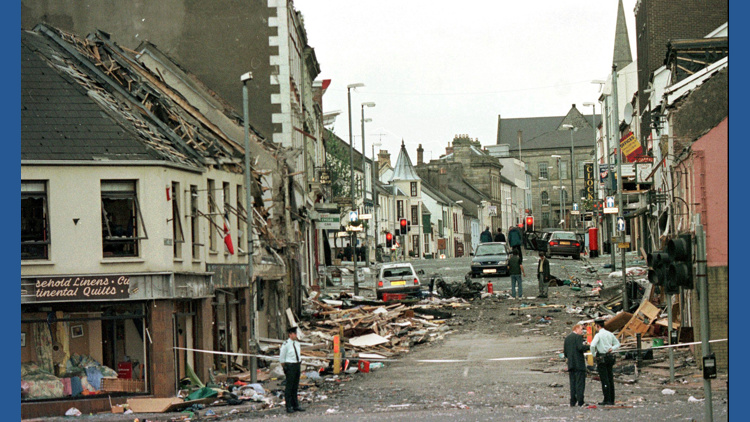As the conflict between Israelis and Palestinians continues, lessons from the Northern Ireland peace process may provide valuable insights for facilitating a fragile ceasefire in Gaza. Notably, the experiences of prominent figures from the Northern Ireland negotiations, including former British Prime Minister Tony Blair and his former chief of staff, Jonathan Powell, have resurfaced amid discussions regarding the future of Gaza.
This week, UK Prime Minister Keir Starmer emphasized the importance of leveraging the lessons learned from Northern Ireland, stating that the UK is prepared to play a significant role in the decommissioning of Hamas’ weapons. The tragic backdrop of the Northern Ireland conflict saw approximately 3,600 fatalities and over 50,000 injuries during decades of violence involving Irish republican militants. The 1998 peace accord notably marked a turning point, largely ending the conflict and leading to the disarmament of the Irish Republican Army (IRA) and other militant factions.
The current situation in Gaza, however, presents unique challenges. Following Hamas’ attack on Israel on October 7, 2023, which resulted in 1,200 deaths and the hostage-taking of 251 individuals, Israel’s retaliatory measures have devastated much of Gaza. According to the Hamas-run Health Ministry, nearly 68,000 Palestinians have died as a result of the ongoing conflict, with many areas facing famine and destruction.
Experts have drawn parallels between the Northern Ireland conflict and the Gaza situation, noting that both involve entrenched hostilities and deep-rooted grievances. Yet, significant differences complicate the potential for a similar peace process in Gaza. Kristian Brown, a politics lecturer at Ulster University in Belfast, remarked, “The level of challenge in the Middle East now is monumental. The levels of destruction in Gaza were not as cataclysmic as those experienced in Northern Ireland.”
The IRA’s reluctance to disarm posed a major obstacle during the Northern Ireland peace negotiations. A secret process, supervised by an international commission, ultimately led to the IRA agreeing to put its arsenal “beyond use.” The disarmament occurred concurrently with discussions aimed at resolving political disputes, a balance that has yet to be achieved in the Middle East despite over three decades of U.S.-led efforts.
The Trump administration’s plan for Gaza, which calls for Hamas to disarm, lacks the comprehensive framework necessary to address the broader Israeli-Palestinian conflict. Notably, issues such as the status of Jerusalem, the return of Palestinian refugees, security arrangements, and the future of Israeli settlements remain unresolved. The absence of a clear pathway to Palestinian statehood is a significant point of contention.
In contrast, the Good Friday Agreement provided a detailed structure for peace in Northern Ireland, establishing a legislature and government. The agreement was the culmination of two years of negotiations supported by the United States, fostering trust between previously opposing factions. Yet, the peace process has not been without setbacks. Following the agreement, IRA dissidents executed a car bomb attack in Omagh, resulting in the deaths of 29 people—the deadliest incident of the conflict. Despite ongoing challenges, political parties once associated with violence, including Sinn Fein, now play pivotal roles in governance.
Academic insights suggest that inclusivity was crucial for Northern Ireland’s peace process. Peter McLoughlin, a senior lecturer at Queen’s University Belfast, emphasized the importance of engaging all parties, including militants, in the political dialogue. He cautioned that excluding Hamas from the future of Gaza could hinder progress. “If there was a broad lesson from the success of Northern Ireland, it’s that an inclusive process worked,” McLoughlin stated.
Starmer’s acknowledgment of the UK’s historical experience in monitoring ceasefires highlights the potential contributions of figures like Blair and Powell. Blair, who served as an envoy to the region for the Quartet—comprising the U.S., European Union, Russia, and the United Nations—has extensive experience in Middle Eastern diplomacy. President Trump has even suggested that Blair could serve on a “Board of Peace” to oversee reconstruction efforts in Gaza.
Despite these developments, skepticism remains about the UK’s role in the peace process. Bronwen Maddox, director of Chatham House, expressed doubts about the feasibility of drawing parallels between the Northern Ireland and Gaza processes, suggesting that while the UK can play a diplomatic part, its impact may be limited.
As the situation in Gaza evolves, the lessons from Northern Ireland’s peace process serve as a reminder of the complexities involved in transitioning from conflict to lasting peace. Whether those lessons can be effectively applied to the current crisis remains to be seen, but the call for an inclusive dialogue emphasizing patience and pragmatism echoes strongly in the ongoing discussions.
